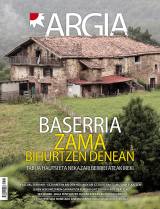Republic of Bilbao
- On 14 July 1789, the Bastille prison in Paris was beaten by revolutionaries. At least that's the story you tell. King Louis XVI wrote in his diary that nothing had happened. The thinkers and political leaders of Euskal Herria were in favor of the movement during the first years, but soon, influenced by the priests and caciques, most of society would rise up against the Revolution.

When the 100th anniversary of the revolution was celebrated, two bertsolaris showed their point of view. If you found one in front of the other, one of them, red, therefore, and the other, white, therefore, you would surely get rid of it. The conversation between Jan Batista Otxalde (1814-1897), of Bidarrai, and Grazien Adema-Zaldubi, would grow through long coplas. The first, we could now say the one on the left, the second, on the other hand, was introduced into the cure, the Bonapartist, who was also a member of the weekly Eskualduna (1887-1944).
The Republic has
been in place for a hundred years.
It's coming
back to us later.
We
appreciate your last visit.
He has now imposed on
us: this is the nice law. In the
twelve verses of Otxalde we only find the praises of the Republic. We can hear immediately the reference of Zaldubi, ironic, scaring, who pits us the shower of the church:
Before I was a king.
Now that king is the one who is right.
Long live the Republic!
I am also king, but not at leisure!The
others were above and I was always under.
… In
that republic it is not ugly,
because we have the Chambrines of Paris ahead.
…
The two Bertsolaris unanimously shout the Bible Republic, but the words do not go in the same direction: although the words are similar, Zaldubi was against (1876) and Otxalde (1889). Debates between the left and the right of France today focus on the issues of two hundred years ago. Until recently, because with Macron the two political markers have already been erased…
Zaldubi's piece was published in 1876 on the occasion of the Floral Games of the Abbey Antón de Urrustoi and found in his papers. The verses of Otxalde date back to 1889
on the occasion of the campaign of deputies of the elected Etcheverry and Berdoly, in the rebirth of Maule.En as much as I have heard, I have laughed with my lips, but now I will
be out of these desires, Cursed be the one who has escaped the
idea of receiving nothing but the Reds!
Marethi-Henri Berdoly (1844-1905) was a left-wing politician rooted in the castle of Uharte Amikuze, a descendant of a famous Baigorri family in 1889 and who lost to Louis Etcheverry (1853-1907), one of the founders of the weekly Eskualduna. These elections were rejected because Berdoly accused Etcheverry of interfering with the Church. However, Berdoly was not a revolutionary socialist and defended private property.
Soon comes the third edition of Zaldubi. Whistling the Republic. It was built based on the bloody ruins of La Commune (1871), very anticlerical and secular. Nothing we like our clergy and the great lords. Although women were only granted in 1944, men then got the right to vote. Zaldubi thought they were vulgar because the workers were then called lazy:
Before, there were no men in the
vicinity. And now look at how cheap it is!
Long live the Republic!
Podore’ta
charges, before what things!
Now the force is the voice of a stick!
…
With an exchangeable mockery, keep in the shadow of Marx the class struggle that was already being examined, facing the servant and the boss:
Now the world was like it was not before: The
little one is able to send the
great… The
raised ones to the boat: now
the guardi’emas, those that the Republic has done the same.
… Disgusting nausea: The republics,
you're sure to be a donkey!
… Otxalde
looks at the progress that the Republic has brought to farmers. Let us not forget that Etxahun de Barkoxe (1786-1862) explained the daily life of the peasants in that gigantic Oficial, about twenty years before:
Then the
poor farmer rested.
I didn't
know what white bread was yet.
He planted it willingly.
Long live the new law!
Now it will be
half of the reactionn.Esta
of course that the laborers of the interior of Euskal Herria did not own the instruments and benefits of work, although they did so since the 19th century. They were the owners of land, the aristocrats or the great lords of the house, and thanks to the intervention of the Republic, the peasants managed to share the results of the camp (parts of houses) half with the main ones.
Otxalde enthusiastically accepts the role of the Republic: he liberated the slave, consolidated equality, guaranteed the prize of the vines or the value and opened the way to wisdom for the popular majority
But the work of the earth could not be lived and the rounds of children from domestic families went to North or South America in search of the future. Farm owners could also investigate the waves of industrial capitalism, which was funding the money, selling the farmhouses that had money, which were being treated at auction and in the length of empty candles.
Our ancestors, the
hal’ikusi, the
past of
forgiveness, grew soaked in sweat.
In the reward of his
wildebeest, no one can be
required, because the
new Law had put him in his tadpole…
Otxalde is well aware of the role of the Republic that responds to his opinion: he liberated the slave, consolidated equality, guaranteed the prize of the vines or the value and opened the way to science for the popular majority:
Now that you've worked in the
Republic, I
want to talk about how
our
fallen ancestors rose
up. Because
we have
in our hands the new laws of then, we must try to comply with them rigurosamente.El man was a slave of man before
the
republic and some authors had realized
he was a labrador in the last state.
It relies on the works of some authors or writers, in general, in peasant society, to recognize the benefits that the Republic brings. Unlike what happened to a certain extent in the Basque Country, because the structure of the lords of the house functioned according to the force, the society at the time of the kings of France was divided into three parts: the peasants were part of the ‘état’, the most humble. On these taxes he rested (gabela, size). Nobles and priests did not pay a penny. After the revolution, the situation would change, promoting the hatred of the richest.
The Bonapartist priest Zaldubi, in his subtle song of nineteen fragments, lists the Taches of the Republic. It investigates them all from an ecclesiastical point of view, about the common chusma called cytoyen, which will always be in the donkey, especially by the turbid red of the cities, despising the contempt of the church.
This is how the coplas overflowing with the mockery of the bonapartist heals Zaldubi. In his subtle nineteen-year-old song he lists the Republic’s footsteps: freedom (they say), taxes (for everyone now), faith (rejected), military service (which lasted five years since 1872) and legislation (votes that provoke disturbances). It investigates them all from an ecclesiastical point of view, about the common chusma called cytoyen, which will always be in the donkey, especially about the turbid red of the cities, and about the contempt of the church.
It was a lot that
was not allowed before.
Now, what I wanted free,
the others, but I didn't. Long
live the Republic!
Because we have abandoned the
old beliefs, now Nihundi doesn't know who to trust.
… Before
I pay tribute and now I
make a contribution, I am attentive that I am dismayed.
…
Those of us who used to own
our blood, Orai gold soldier, are for war.
… The first mandates,
the present legislative Geroni gare.
…
The republic never enjoyed good reputation among the journalists of the Corpus CHRISTI. In 1914 he had almost 10,000 copies of a roll call and reached all the houses of Iparralde. He made a continuous adaptation of thought, the true war was an ideological machine.
The Republic, the third administered by the bourgeois Baskets (1870-1940), never enjoyed good reputation among the Crown's journalists. In 1914 he had almost 10,000 copies of a roll call and reached all the houses of Iparralde. He made a continuous adaptation of thought, even more out of the traumatic distinction between the Church and the State of 1905. The real war was an ideological machine. This society would end up collaborating with the German occupants since 1941.
In Anartean, Otxalde for conviction and Zaldubi for revenge, each in its own way, give us the opportunity to proclaim the Biba Republic.
XV. Cup Championship
Where: In the gaztetxe Hiruputzu (Zarautz)
When: 22 December
Oblique: Aner Peritz, Oier Aizpurua, Alaia Martin, Jexux Mari Irazu, Etxahun Lekue, Aitor Bizkarra, Eneritz Artetxe, Maider Arrangi, Joanes Illarregi and Oihana Arana.
... [+]
Danel Goikolea Arrasateko bertsolaria urtarrilaren 14an joan da. Hil baino ordu batzuk lehenago, bertso sorta kantatu hau zabaldu zuen lagunen artean. Umore handia darabil eta Pablo Milanesen Yolanda kantu ezagunaren hoskidetasunarekin jolasten du: Holanda du izenburu sortak,... [+]




















